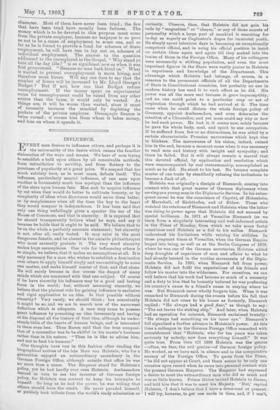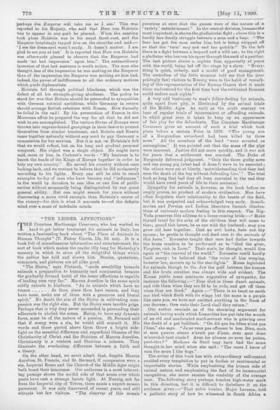INFLUENCE.
EVERY man desires to influence others, and perhaps it is the universality of the desire which causes the familiar elaboration of the ways and means. We hear of men trying to establish a hold upon others by all conceivable methods, from intimidation to servility, and from flattery to the purchase of popularity at a great price. We suspect that too much subtlety here, as in most cases, defeats itself. The influence, particularly mental influence, of one man upon another is fortunately much less mystical than the influence of the stars upon human fate. Men seek to acquire influence by wit when they would do better to cultivate honesty, or by complexity of ideas when directness would serve them better, or by complaisance when all the time the key to the heart they would conquer is independence. It has been said that Only one thing unfailingly gives a speaker the ear of the House of Commons, and that is sincerity. It is required that he should transparently believe what he says, and say it because he holds that it ought to be said. We believe that to be on the whole a perfectly accurate statement; but sincerity is not, after all, easily tested. It may exist in the most dangerous fanatic, and be absent in the amiable philanthropist who most earnestly protests it. The very word sincerity makes huge assumptions. One rule for influencing others is Ho simple, we believe, that it makes no assumptions at all. It is only necessary for a man who wishes to establish a domination over others to apply himself singly and unremittingly to some one matter, and make himself master of that, and that alone. He will surely become in due course the despot of many minds which are concerned with that one subject. Of course if be have sincerity his influence may be a good and lasting force in the world ; but, without assuming sincerity, we believe that the plainest rule for gaining influence is exclusive and rigid application to an idea. Is that possible without sincerity ? Very rarely, we should think ; but conceivably it might be so, and we are in search now of the narrowest definition which is adequate. A man may come to possess great influence by preaching an idea incessantly and having at his disposal all the history of that idea, although he under- stands little of the hearts of human beings, and is interested in them even less. Thus Bacon said that the true composi- tion of a counsellor was to be skilful in his master's business rather than in his nature. " Then he is like to advise him, and not to feed his humour,"
Our thoughts have run in this fashion after reading the biographical notices of the late Herr von Holstein, who for a generation enjoyed an extraordinary ascendency in the German Foreign Office, although outside that office he was no. more than a name. The Emperor stood for Holstein's policy, yet he had hardly ever seen Holstein. Ambassadors desired in vain to see the inventor of German foreign policy, for Holstein was content to keep his triumphs to himself. So long as he had the power, he was willing that others should have the credit. Ho never paraded himself, or publicly took tribute from the world's ready admiration or
curiosity. Observe, then, that Holstein did not gain his ends by " magnetism" or "charm," or any of those secrets of personality which a large part of mankind is searching for to-day as eagerly as Cagliostro'a dupes for immortal youth. Ho simply spent laborious days in becoming an exceptionally competent official, and in using his official position to insist on certain ideas again and again till they soaked into the brains of those in the Foreign Office. Many of his colleagues were necessarily a shifting population, and even the most important figures in the State were vastly junior to Holstein in experience and knowledge of the Department. This advantage which Holstein had belongs, of course, in a measure to the permanent officials of all the Departments of State in Constitutional countries, but probably no one in modern history has used it to such effect as he did. His power was all the more real because it grew imperceptibly, and no one could point to a particular coup or act of inspiration through which he had arrived at it. The time came when lie could dictate the whole foreign policy of Germany, appoint Ambassadors, and even determine the selection of a Chancellor, and yet none could say why or how he had such power. He had it, it seems now, solely because he gave his whole body, soul, and spirit to one occupation. If he suffered from few or no distractions, he was aided by a certain characteristic Prussian narrowness which kept him in blinkers. The narrowness of his vision, indeed, ruined him in the end, because a moment came when it was necessary to read men and history with insight and sympathy; and there be failed. But it will always remain a marvel that this devoted official, by application and resolution which were unaccompanied by real statesmanship, accomplished as much as he did. He stuck to his last. He became complete master of one trade by steadfastly refusing the invitations to become a Jack of all.
Holstein was originally a disciple of Bismarck, coming into contact with that great master of German diplomacy when serving a.s a young man in time Diplomatic Service. In his subse- quent career he was the conscience of Caprivi, of Hohenlobe, of Afarschall, of Richthofen, and of Billow. Those who watched the relations of Bismarck and Holstein when the latter' was rising to power agree that Holstein did not succeed by special brilliance. In 1871 at Versailles Bismarck (as we learn from a singularly interesting and well-informed article in the Times of Monday, from which we take some facts) sometimes used Holstein as a foil to his sallies. Bismarck understood his limitations while valuing his abilities. In those pregnant times at Versailles, when the German Empire leaped into being, as well as at the Berlin Congress of 1878, where lie was one of the German secretaries, Holstein added deep draughts of experience of men and affairs to what he had already learned in the routine movements of the Diplo- matic Service. In 1895, when Bismarck fell from power, Holstein did not fulfil the expectations' of his friends and follow his master into the wilderness. For ourselves, we can well believe that his work had become so much of a necessity and a duty to him that he honestly believed he was preferring his country's cause to a friend's cause in staying where be was. But Bismarck never wholly forgave him. When it was remarked to Bismarck during the events before his fall that Holstein did not come to his house as formerly, Bismarck replied : "He always had a good flair," as though to say: " The rat leaves the sinking ship." And later, when Holstein had an operation for cataract, Bismarck exclaimed brutally: "He always had something on his inner eye." Bismarck's fall signalised a further advance in Holstein's power. At this time a colleague in the German Foreign Office remarked with astonishment that "Holstein, who for ten years was taken seriously by nobody, now does everything himself." It was quite true. From then till 1906 Holstein was the genius —often, we fear, the evil genius—of German foreign policy. He worked, as we have said, in silence and in the comparative secrecy of the Foreign Office. To quote from the Times, " lie did not appear at Court, and there seems to be only one occasion upon record when he came into personal contact with the present German Emperor. The Emperor had expressed a desire to meet the extraordinary man who did so much and was so little known. Prince Billow invited Holstein to dinner, and told him that it was to meet his Majesty. But,' replied Holstein, 'I don't believe that I have a dress-coat at present. I will try, however, to get one made in time, and, if I can't,
perhaps the Emperor will take me as I am! This was reported to his Majesty, who said that Herr von Holstein was to appear in any garb be pleased. When the meeting took place Holstein was in his usual froek-coat, and the Emperor laughingly tapped him on the shoulder and said :— ',I see the dress-coat wasn't ready. It doesn't matter. I am glad to see you at last.' It is reported that Herr von Holstein was afterwards pleased to observe that the Emperor had made 'no had impression' upon Lim." The extraordinary inversion of that last sentence is worth notice. The man who thought leas of the impression he was making on the Emperor than of the impression the Emperor was making on him had, indeed, the power of indifference to all the ordinary motives which. guide diplomatists.
Holstein fell through political blindness, which was the defect of all his strength-giving aloofness. The policy he stood for was that Britain should be persuaded to !sympathise with German colonial ambitious, while Germany in return should arrange British relations with Bessie. How dismally he failed in the end By his persecution of France in the Moroccan affair be prepared the way for all that he did not wish to see accomplished. The various States of Europe were thrown into unprecedented groupings in their desire to protect themselves from similar treatment, and Britain and Russia came together naturally without any need to pay Germany a cenimiesion for her services, But it is not. on Holstein's fall that we would reflect, but on his long and gradual personal conquest. His object was a single object. He might have said, more or less, in Carteret's words : " My business is to knock the beads of the Kings of Europe together in order to help my own country." He served his country without once looking back, and we venture to believe that be did so sincerely wording to his lights. Every one will be able to recall examples to-day of men who have become real " influences " in the world by devotion to one idea or one line of public service without necessarily being distinguished by any great general ability. But one might search for years without discovering a }none vivid example than Holstein's career of the victory—for this is what it amounts to—of the definite mind over 4 mites of indefinite minds.











































 Previous page
Previous page